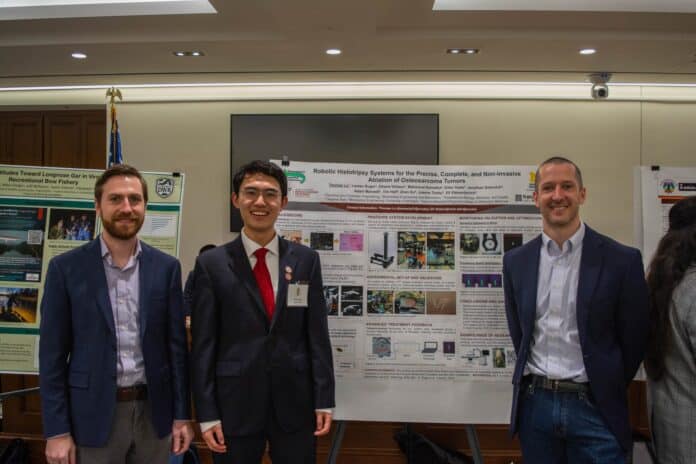For a group of Virginia Tech students, a recent conference at the state capitol provided an opportunity to engage lawmakers, share groundbreaking research, and build valuable career skills.
“Opportunities for students to present are so important,” said Keri Swaby, director of the Office of Undergraduate Research. “It closes the cycle of research to show what they’ve learned and defend their work.”
The event, Undergraduate Research Showcase at the Capitol, was held in February and hosted by the Network for Undergraduate Research in Virginia. It featured more than 30 posters presentations from 16 schools across the commonwealth. Lily Casteen, Thomas Lu, and Sindhu Dhaveji represented Virginia Tech and were selected from a field of more than 60 students.
“With this, they were talking to people who can affect change at the state level and showcased their incredible work,” said Swaby. “This is real, authentic, original research that has the potential to change lives.”
Innovative research
The presentations were held in subcommittee conference rooms in the House of Delegates, providing students direct access to state lawmakers in highlighting the groundbreaking research happening on the Blacksburg campus.
For Lu, a senior double majoring in electrical and computer engineering, it was an opportunity to share his work at the Vlaisavljevich Research Lab.
“Our lab works with a technology called histotripsy, which is an emerging way to treat a broad range of disorders noninvasively, but I’m particularly focusing on bone cancer,” said Lu. “It’s exciting, and Virginia Tech is a great environment for research and allowing students to grow.”
Lu’s poster presentation, “Developing Advanced Robotically Guided Histotripsy Systems for the Noninvasive Treatment of Bone Tumors,” was completed under the guidance of Eli Vlaisavljevich, associate professor in the Department of Biomedical Engineering and Mechanics.
“This lab specifically makes me feel blessed to work with people from diverse backgrounds and has shaped the way I think as a researcher,” said Lu. “Presenting at the state capitol has given me this new confidence that I can engage and communicate our work to people outside our field.”
Professional development
For many students, conducting research and poster presentations can help them pursue an advanced degree or lead to their first job after graduation.
“I went to a lot of different posters and made a point to ask each student what their plans were beyond graduation,” said Adam Maxwell, research associate professor in the Department of Biomedical Engineering and Mechanics, who attended the event. “They all had something they wanted to continue doing with their research, and their projects seemed to help determine their career trajectories at this point.”
Dhaveji, a clinical neuroscience major from Ashburn, Virginia, presented her poster, “Exploring the Impact of Artistic Engagement on Neural and Psychological Outcomes for Mental Health.” The research was done at the Embodied Brain Lab with the support of Julia Basso, assistant professor in the Department of Human Nutrition, Foods, and Exercise.
“It was a little nerve-wracking at first. We were unaware of who was going to be there and what background each legislator was coming from,” said Dhaveji. “But as I started sharing my research, I found myself really enjoying the experience overall.”
“I’m still debating between research and medicine as career paths,” she said. “If I go into medicine, I want to be a physician who’s not only focused on individual health but also involved working outside the clinic, and this event really helped me understand that.”
Showing impact
For legislators and agency officials, the event provided an opportunity to see first-hand the value of the state’s investment in public universities and their students.
“It was mutually beneficial for the students and attendees, particularly people from the state offices, to understand the value of undergraduate research,” said Vlaisavljevich. “It’s important for them to realize their support of universities is meaningful and has a large return on investment.”
As a land-grant university, Virginia Tech has a three-part mission of teaching, research, and engagement through shared knowledge and resources with the state and global community. About 20 percent of the university’s general budget comes from the commonwealth’s General Fund.
Student research is a valuable piece of any degree program and part of Virgina Tech Advantage, a university initiative to offer the full educational experience to all students regardless of demonstrated financial need. This work can also qualify for the Bridge Experience Program, which are immersive, career-building opportunities to connect classroom learning to real-world professional environments through internships, undergraduate research, study abroad, or community-based learning. As part of Virginia Tech’s commitment to experiential learning, many academic majors require students to complete a bridge experience before graduation
Visit the Office of Undergraduate Research website to learn more about research opportunities across the campus.
Written by Bethany Lenhardt, editorial intern at the Office of Undergraduate Education.

